- Home
- Lemony Snicket
File Under: 13 Suspicious Incidents (1-6) Page 4
File Under: 13 Suspicious Incidents (1-6) Read online
Page 4
We are the Big Bad Brick Gang. You probably can’t believe we struck here, but we did. You’ll never figure out what makes us choose a place to strike. By the way, if you want to call us the BBBG, that’s fine with us.
Yours truly,
The Big Bad Brick Gang,
aka the BBBG
“We’ll never figure out what makes them choose a place to strike,” Mimi said. “What in the world do Boards and Swords have in common?”
“Nothing,” Stew said.
“That’s right, son,” Harvey said proudly. “You’re a genius.”
“They rhyme,” I said.
Mimi frowned. “What rhymes?”
“The names of the stores,” I said, and turned to Muriel Distinguished. “Are there any other stores with similar-sounding names?”
“There’s an electrical supply store, Cords, just down the street,” the shopkeeper said, “and across the square is Gourds, where I buy all my decorative squashes. There used to be a Scandinavian travel place called Fjords, but it went out of business last winter.”
I turned to the Mitchums. “The crimes of the Big Bad Brick Gang appear to be following a pattern. If you like, I’d be happy to help you keep an eye on those two other businesses.”
“First of all, let’s call them the BBBG,” Harvey said. “And thirdly, we don’t need your help when we have Stewart around. Our son is smarter than you, and more handsome. Isn’t that right, Stewie?”
“You’re so nice to me, Daddy,” Stew said, and when his father chuckled and turned his back, he gave me a big, hard poke.
That was Saturday.
I asked the Bellerophon brothers, known as Pip and Squeak, to drive me around the old neighborhood as soon as the sun came up. All was quiet at Cords. Nothing was amiss at Gourds. But then through the taxi window I saw more shattered glass, and the Bellerophons deposited me in front of another vandalized business with a stunned shopkeeper and police officers arguing in front of it. There were pink and red petals on the sidewalk, along with the familiar sight of broken glass, and painted petals decorated the sign over the door. I looked at the name of the business and sighed the sigh of someone who’s wrong and sighs about it.
“And I’m telling you, Harvey,” Mimi said, “the dead bird is what changed her mind about her mother’s old suitor, and that’s why she came back.”
“I don’t know why you bother to read at all,” Harvey said, “when you understand no more than a garden slug.”
“I’ll slug you if you keep talking like that,” Mimi growled.
“I can’t believe you said that! Apologize at once!”
“You’re the one who got me angry enough to say it! Apologize for provoking me!”
“Apologize for provoking me!”
“Apologize for provoking my provocation!”
My shoes crackled on a piece of broken glass, and the bickering Mitchums turned to glare at me. “You have some nerve coming around here,” Harvey said. “Boards and Swords don’t rhyme with the name of this store. It’s not even half-rhyme!”
“Chrysanthemums,” Mimi said, “is a Respectable family business, and we are helpless to bring the BBBG to justice.” She waved another piece of paper, but I didn’t need to read it. I was sure it said that the police were helpless to bring the gang to justice.
“I’m Lemony Snicket,” I said to the shopkeeper. “I’m sorry about what happened to your store. I had a theory about what was going on, and I’m sad to say I was wrong about it. I assume you’re Ms. Respectable?”
The shopkeeper gave me a curious look. “My name is Smith,” she said. “Delphinium Smith. Our family happens to be respectable, but it’s not our name.”
“I’m sorry,” I said, although I was used to asking the wrong questions during my days in Stain’d-by-the-Sea. “Was anything stolen, Ms. Smith?”
“My daughter’s just checking,” the shopkeeper said. “The brick almost hit the bed where she slept last night.” She dropped her broom for a moment and cupped both hands to her mouth to call into the shop. “Florence!”
A girl emerged from the shop, giving her mother an apologetic look and holding a book I recognized. “Sorry, Mother. I got distracted by a good part of my book. Peter is just escaping from Barbados and has decided to be a buccaneer.”
“It’s about to get even better,” I said.
“Don’t tell me what happens next,” Florence said. “I hate having a book spoiled.”
“I would never do such a thing,” I said.
“Another bookworm,” the shopkeeper said to me with a grimace. “I don’t know where Florence gets those books. Personally, I think literature is garbage. None of my daughters are allowed a library card, and Florence can’t have a bookshelf in her room unless she builds it herself.”
“I’m sorry to hear you say that,” I said. “It makes me less enthusiastic about telling you I’ve solved the crimes. But perhaps the guilty parties will work together to repair the windows and explain their behavior.”
“Hold on,” Harvey Mitchum said. “Are you saying you know how to stop the Big Bad Brick Gang? Because according to something I read recently, no one will ever figure out how to stop them.”
“They’re not really a gang,” I said. “Just two people in cahoots.”
“Name them,” Mimi said, “so we can arrest the cahooters.”
“Yes,” Harvey said, for once in agreement with his wife. “We can’t have any cahooting in this town.”
I didn’t tell them. Nor did I tell Theodora anything that evening, when she came home and asked me what I’d done all weekend. I told her nothing and she gave me a teacup decorated with an ugly pattern. Unchaperoned people often do things that respectable adults don’t understand, and the unchaperoned people like to keep it that way. The gang probably wouldn’t strike again, I thought, putting my teacup on the floor where I might carelessly step on it in the morning.
And that was Sunday.
The conclusion to “Bad Gang” is filed under “Homemade Furniture,” here.
SILVER SPOON.
I was in my favorite seat in the library, but it wasn’t helping me like the book any better. It was a book people kept putting in my hands and telling me I was going to love, the way the doctor tells you the needle won’t hurt a bit. The book began the way it always began before I gave up on it: with a man carrying around a drawing of a snake that had just eaten, and asking people what they thought of it. I thought it was no way to start up a conversation.
“I hate to interrupt,” Dashiell Qwerty said to me, which is a better way.
“It’s quite all right,” I said to Stain’d-by-the-Sea’s only librarian.
“I thought you wouldn’t mind,” Qwerty said. “You were scowling pretty hard at that book.”
“Everyone else seems to like it, so I thought I’d give it another try.”
“Perhaps I can suggest a better way to occupy your time.”
“I’m still not sure I’m ready for that book about the woman who falls asleep and kills a horse.”
“That’s not what I was suggesting. Some library patrons need some assistance, and I thought you might be able to help.”
“Why me?”
“Because I understand you’re good at assisting people,” Qwerty said, “and because it’s closing time and you might not have anything better to do.”
I looked out through one of the library’s drafty windows. I hadn’t noticed it was so late. The sky was dark blue twilight, pretty to look at but lonely to walk under. Qwerty was right. I didn’t have anything better to do. I put the book back on the shelf and waited for Qwerty to turn off the lights and give the room one last look before he locked up and I followed him out into the quiet streets of town. We walked across the scraggly lawn, where the ruins of an old statue lay sad and cold in the evening air. Qwerty rattled his fingers against it as we walked by. The librarian was the sort of librarian who didn’t look like a librarian. His hair was an unusual kind of unusual—a ragged, a
ngular mess that he must have thought was stylish—and he always wore a leather jacket with bits of metal stuck here and there. But he was very much a librarian like other librarians, because I knew I could trust him. Even so I paused for a moment when, after several silent blocks, he stopped at a large, gaping hole in a chain-link fence. Behind the fence I could see some unhealthy-looking shrubs, peppered with litter and pressed up against the fence as though trying to escape.
“Where are we going?” I asked.
“I told you,” Qwerty said. “Some of my patrons need help.”
“And they live here?”
“At present they live in a small camp on the outskirts of town.”
“At present?”
“That means ‘right now.’ ”
“I know what it means. Where do they live the rest of the time?”
“Wherever they can find shelter,” Qwerty said. “They’re a group of people who move from town to town.”
“So they’re not citizens of Stain’d-by-the-Sea,” I said.
“They’re visitors, and readers,” Qwerty said, “like you.”
He stepped through the fence and I followed. The wind picked up paper bags and old candy wrappers and whirled them around my legs as we walked through the rustling landscape. Qwerty was right. I was a visitor in town. I did not know how long I would stay, and each day seemed to uncover another mysterious event in a town full of them. Stain’d-by-the-Sea was the sort of place where secrets lurked everywhere, like shuddering plants behind a fence I’d never thought twice about. Qwerty was also right about my being a reader, and I’d read here and there about people who lived as Qwerty had described. Drifters, some people called them. There were other words, too.
The sun left the sky slowly, leaving pale, hovering streaks above us, and before long we were at a small grove of trees that looked shady. “Shady” is a word which means “giving shade.” It is also a word which means “ever so slightly sinister.” I followed Qwerty into the grove, stepping over roots and ducking under branches that stretched out like spooky handshakes.
At last we reached the drifters’ camp, which was little more than a few tents pitched on dirt that had been tramped flat. There was a small circle of stones where a fire cast its warm red glow onto the faces of perhaps ten people, huddled in blankets together around the flames. They were mostly men, looking tired and dirty, although there were at least two women, and I could see a dog lying close to the fire with one eye open and one ear missing.
“Qwerty,” said the man with the longest beard. “Welcome. Do you want soup? Who’s your companion?”
“This is Lemony Snicket,” Qwerty said, “and soup would be nice.”
“Nice to know you, Snicket,” said the bearded man. “Have a seat. Are you going to read to us, Qwerty?”
“I hope so,” said one of the women, whose voice was hoarse or perhaps just exhausted. “Last night you stopped at the part where the bookcase fell on him.”
“Last night,” Qwerty said, sitting on a log and motioning me to join him, “you were telling me about some trouble that Randall got himself into.”
“He didn’t get himself in trouble,” said the woman. “Trouble came and found him, and it arrived by limousine.”
“Let Randall tell the story,” the bearded man said, and the drifters turned their eyes to a short, meek figure who sat on the ground next to the dog. He was a man a little younger and a little cleaner than the others, wearing a pair of glasses that were slightly askew, a word which here means “crooked, and should be repaired.” He looked at us nervously and patted the dog with one gloved hand.
“That’s a handsome dog, Randall,” Qwerty said gently.
Randall smiled. “He’s not handsome,” he said, “but he’s my best friend in the world and one of the dearest things in my life.”
“What’s his name?” I asked. “And what’s the trouble?”
“His name is Ashbery,” Randall said, “and the trouble is that one of my other dearest things was stolen from me.”
“What was stolen?” I asked, thinking of all the things that had gone missing in Stain’d-by-the-Sea. It was as if the entire town were sinking into quicksand, item by item, never to be seen again.
“A silver spoon,” Randall said, “engraved with the letter R. It was a gift from my grandfather when I was born.” He sighed and looked at the crackling fire for a moment. “I’ve lost everything else from my old life, but I’ve managed to hold on to my grandfather’s gift. Until yesterday.”
“What happened yesterday?”
“Smogface Wiley stole his spoon is what happened,” said one of the drifters. “He’s a low-down scoundrel in high-priced clothing.”
“The Wileys,” Qwerty explained to me, “are a wealthy family who own businesses all over the area, from lumber to tube socks. Smogface is the only Wiley left in town. Smogface isn’t his given name, as you might have guessed, but it’s what everyone calls him because of his habit of smoking cigarillos.”
“They smell terrible,” the bearded drifter said, “but something tells me that man would smell terrible anyway.”
The drifters muttered in agreement, and Randall patted Ashbery glumly. “Wiley drove past me a few days ago,” he continued, “and saw me using the spoon to eat a can of peaches in light syrup.”
“Were you here at the camp?” I asked.
“No,” Randall said. “I was working in town. I’m a poet by trade, but lately I’ve done a lot of window washing. Diceys Department Store had me wash their windows for a few coins and some canned goods they had lying around. Ashbery stayed behind to guard the camp as usual. Nobody hires a window washer who brings his dog around.”
“Same with lizards,” said another man by the fire.
“Smogface had his driver stop and rolled down the limousine window to ask me about the spoon. He wanted it for himself and kept offering me things. He offered a carton of cigarillos, but I don’t smoke. He offered me his pinkie ring, but I have no use for one. He offered me a ride in his limousine and a hot bath at his mansion. I was tempted, but I still had windows to wash.”
“Why did he want the spoon so much?” I asked.
“He said he had a collection,” Randall said, “but I think he just wanted to see me eat canned peaches with my hands.”
The bearded man shook his head in disgust and handed Qwerty and me each a steaming mug of soup. The mugs had the name of a hardware store I’d never heard of, along with an image of an octopus holding a bunch of tools. The store was gone now, probably. The soup was very hot and very thin, more like earthy tea than soup. I didn’t like sipping it, so I asked another question.
“What happened yesterday?” I said.
“Yesterday we all went to harvest mushrooms out by Blotted Boulevard,” Randall said. “Armadale over there is good at spotting the edible ones. When we returned to camp after sundown, Ashbery was barking like crazy, the spoon was gone, and there was an extinguished cigarillo smoking by the fire.”
“Did you ask Wiley about it?”
“Of course I did,” Randall said. “I went right to his mansion last night.”
“We all wanted to go with him,” said the woman, “but Randall insisted on going alone.”
“The mansion is that big building over on Nib Court, with a big brass walrus out front. It’s a nice enough place, but nobody was nice to me there. Wiley wouldn’t even see me. He had some servant throw me out on my ear. Qwerty told me he knew someone who’d retrieved a stolen object from the Sallis mansion. He thought you could help me, too.”
To be polite, I took a sip of soup and tried to think about the Sallis mansion instead of the earthy taste in my mouth. There was a much bigger case I was working on, a more complicated one that involved the enormous house the Sallis family had once occupied, along with a butler and numerous other servants. “I’ll go out there tomorrow morning,” I said, “and see what I can do.”
“I’d be most grateful,” Randall said. “Anytime you nee
d a sonnet, I’m your man.”
I thanked him and stood up and headed out of the grove with Qwerty. We were quiet all the way back to the Lost Arms, and later that night, when I got into my bed in the Far East Suite, the narrow bed and the dusty room felt much more comfortable than usual as I thought about Randall and the spoon and all the people huddled around the fire. Drifters. Tramps. Vagabonds. Derelicts. So many words for such people, and all of them unflattering.
The next day I made my way to the Wiley mansion. It was a bright, quiet morning, and the last of Stain’d-by-the-Sea’s birds fought over a few worms wriggling on the sidewalk. I found the house easily enough. A brass walrus stands out. The driveway was paved with seashells and occupied mostly by a long, black limousine. It was a handsome enough car, but the windows needed washing. In a storybook, the villain lives in a castle and the hero lives in the woods. I had to remind myself that this wasn’t a storybook. The meek, bespectacled drifter could be the villain, I thought, making up a story about Smogface Wiley just because he has a fancy house and gets driven around in a limousine.
A servant answered the doorbell and just stood there glaring at me, waiting for me to state my business. I stated my name instead and told her I was visiting from the city. She shut the door again. Birds chirped. She came back and let me in.
Smogface Wiley was seated at the end of a very long, very polished wood table, as if he had invited a bunch of people to a fancy breakfast and they had all forgotten to come. There were folded napkins and monogrammed silverware at each place setting but food at only one. Wiley looked about halfway through his breakfast. There was a plate with a half-eaten fried egg and a small pile of roasted potatoes where a large one would have fit. There was a bowl half full of cereal and a basket with half a blueberry muffin. Wiley had a fresh peach in front of him and in his mouth a cigarillo, which is a bit like a cigar and a bit like a cigarette and more than a bit like a smelly nuisance. The smoke from the cigarillo made a small cloud that had for some reason stuck around his nose. “Smokynose” would have been a better nickname, I thought.

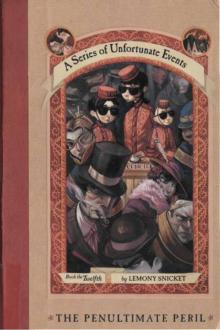 The Penultimate Peril
The Penultimate Peril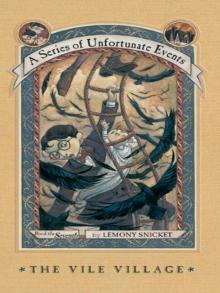 The Vile Village
The Vile Village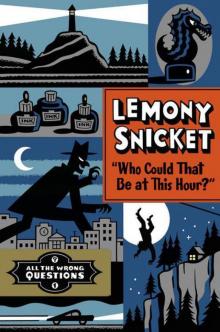 Who Could That Be at This Hour?
Who Could That Be at This Hour?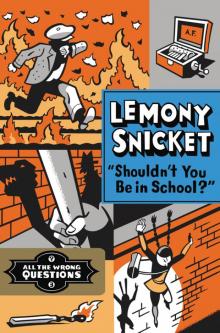 Shouldn't You Be in School?
Shouldn't You Be in School?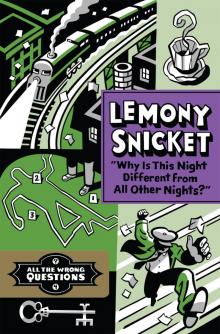 Why Is This Night Different From All Other Nights?
Why Is This Night Different From All Other Nights?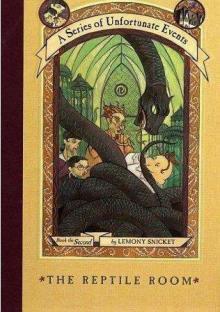 The Reptile Room
The Reptile Room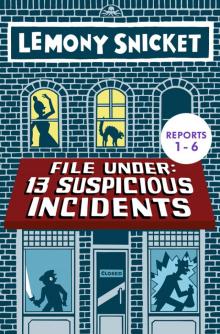 File Under: 13 Suspicious Incidents (1-6)
File Under: 13 Suspicious Incidents (1-6) The End
The End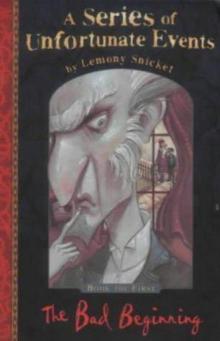 The Bad Beginning
The Bad Beginning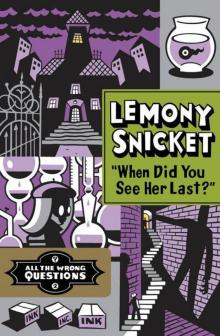 When Did You See Her Last?
When Did You See Her Last?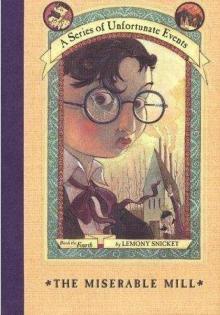 The Miserable Mill
The Miserable Mill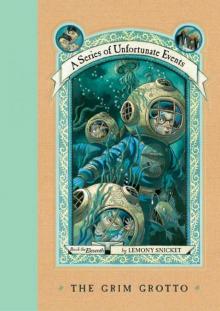 The Grim Grotto
The Grim Grotto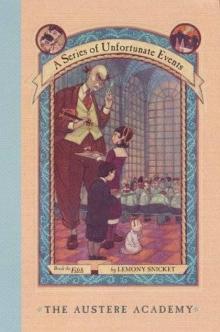 The Austere Academy
The Austere Academy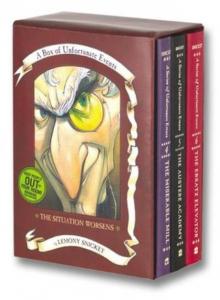 The Ersatz Elevator
The Ersatz Elevator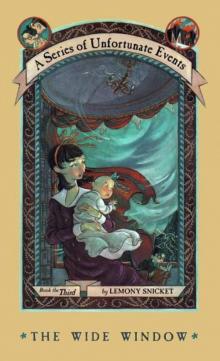 The Wide Window
The Wide Window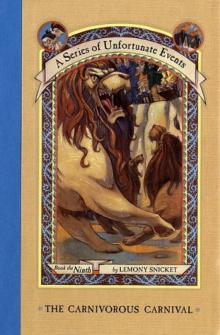 The Carnivorous Carnival
The Carnivorous Carnival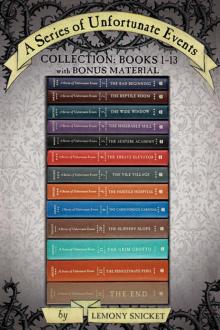 A Series of Unfortunate Events Box: The Complete Wreck
A Series of Unfortunate Events Box: The Complete Wreck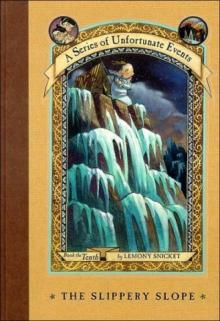 The Slippery Slope
The Slippery Slope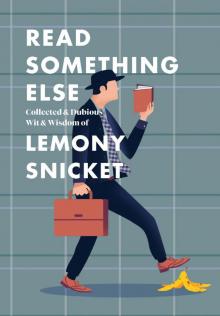 Read Something Else
Read Something Else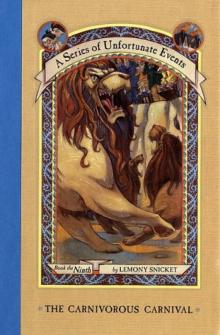 The Carnivorous Carnival asoue-9
The Carnivorous Carnival asoue-9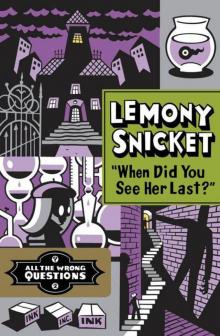 When Did You See Her Last
When Did You See Her Last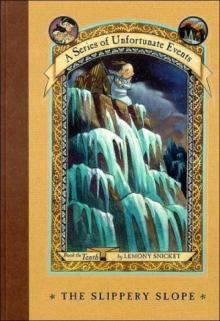 The Slippery Slope asoue-10
The Slippery Slope asoue-10 The Hostile Hospital asoue-8
The Hostile Hospital asoue-8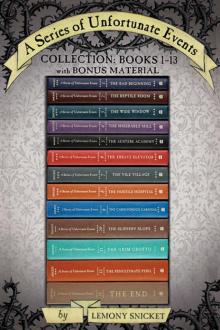 A Series of Unfortunate Events Collection: Books 1-13 with Bonus Material
A Series of Unfortunate Events Collection: Books 1-13 with Bonus Material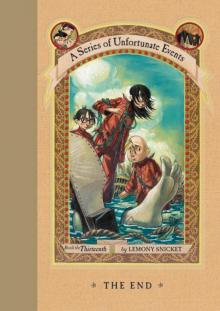 The End asoue-13
The End asoue-13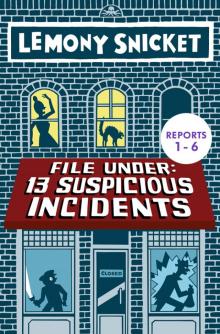 File Under
File Under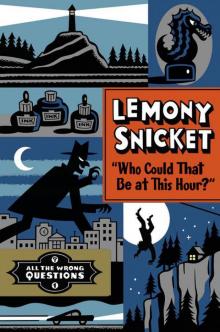 Who Could That Be at This Hour? (All the Wrong Questions)
Who Could That Be at This Hour? (All the Wrong Questions)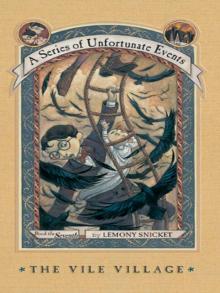 The Vile Village asoue-7
The Vile Village asoue-7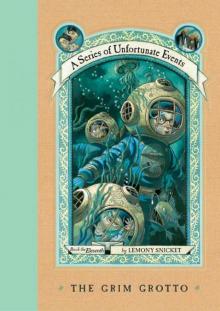 The Grim Grotto asoue-11
The Grim Grotto asoue-11